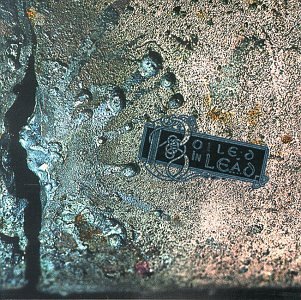 Sol Foster penned this review.
Sol Foster penned this review.
While Boiled in Lead’s fifteenth anniversary collection, Alloy, is equally accessible to the new listener and essential to the old, the companion Alloy2 is a 2 CD set that is aimed squarely at the diehard Leadhead. Alloy 2.1 has 18 tracks are studio and live recordings garnered from previous versions of the band; Alloy 2.2 has 12 live tracks from thecurrent Adam Stemple era, plus an oddball hidden studio track. The music, frequently rough and unruly, manages to capture a band that is something more than that found on their studio albums: more raucous, more idiosyncratic, more improvisational, more wacky. If you thought the Old Lead song “Gypsy Rover” was as noisy and out-of-control as folk music gets, think again — the live version on Alloy 2.1 makes the original sound as musically conservative as the Kingston Trio. In short, all the traits that make Boiled in Lead endearing are here, only more so.
I see three categories of material on this set. The first is studio recordings — remixes, demos, and unreleased material. The two remixes, “Fisher’s Hornpipe” and “Spanish Lady” are only slightly different than the noteworthy originals. The demos are a mixed bag. “Sheath & Knife” is simply “Son, Oh Son” without the zurna solos, rather than the related but rather different song found, for example, on the recent Maddy Prior album. THe hidden track on Alloy 2.1 is “Twa Corbies”, is an evocative early version of the classic tune. The acoustic “Newry Highwayman”, sung by Todd Menton, is every bit the equal of the excellent Antler Dance track.
The most notable demo is the hard-driving “Rights of Man/La Rotta”. Emma Bull mentions this tune in War for the Oaks, and I’d always wondered what she was talking about. It’s a crime this infectious, rocking instrumental never made it to a studio album.
In addition, there are three finished but previously unreleased tracks. The first two are from the Jane Dauphin period: the nice but unexceptional fiddle and saxophone instrumental “Rakes of Mallow” and the lovely song “Wild Rover.” The last, “Gatling Gun,” is an average Todd Menton composition from the tail-end of his stay with Boiled in Lead.
The second category is live versions of familiar Boiled in Lead tunes. “My Son John” is a very solid example. (It previously appeared on the cassette A&E, just as the “Gypsy Rover” here previously appeared on Boiled Alive ’92.) The modern lineup takes their tunes “Urgos” and “Drowning” and spins them out in long, highly improvised versions. The latter goes right to the edge, very nearly losing the thread of the song, until Anders uses a few well-timed drum beats to call the gang together for the final restatement of the theme. It’s the sort of fabulous live moment that studio albums never capture.
And while “State Trooper” and “Pig Dog Daddy” didn’t make it onto Alloy, they are both on Alloy 2.1. The live versions are particularly raucous, with Todd Menton singing and telling a story of being stopped by the state police as a bridge between the two. For the record, two days in a row our Black Lab, Shadow, lay next to me as I listened to this album in preparation for writing this review. Both times she was resting peacefully until Michel Ravaz started his little fiddle licks during the storytelling section. Every time he’d play, she’d cast a puzzled look at my speakers. Then when “Pig Dog Daddy” started, she’d get up and leave the room. All I can say is I disagree with her musical judgment in this case.
The third and final category is live versions of songs which haven’t made it to a Boiled in Lead studio album yet. The older Boiled in Lead is represented with a number of likable instrumental medleys. Most notably, “Welsh Tunes” shows off the band’s gentler side with a hauntingly lovely Drew Miller recorder solo. The modern lineup has only one of these medleys, but it’s a good one, starting calmly with “The Two Sisters” and gradually building to a nearly out of control “Pinch of Snuff.” Instead, there are a trio of songs more in the “Fuck the Circus”/”Puking in the Heather” vein. They’re fun, but even the best of them, “She”, is a minor song. On the other hand, the traditional folk song here, “House Carpenter”, is a good one, with a nice acoustic arrangement. (This is the same song known as “Daemon Lover” in Charles Vess’s Book of Ballads and Sagas.)
There are also three new single tune instrumentals. The great find among them is “Sobabamba,” a simple catchy tune which Boiled in Lead turns into eleven minutes of improvised wonder. Playful and a bit funky, I prefer it to any of the recent instrumentals the band has done.
As a whole, there are a few downsides to this collection. It has one of those “two discs in the space of one” jewel cases that doesn’t quite securely hold the discs. The sound quality is sometimes dodgy, just as one would expect from demos and audience recordings. Sometimes the band gets a bit carried away, and I’m sure some people don’t appreciate multi-minute drum solos. The set is on the expensive side, though not outrageously so considering how much music is packed into each disc.
Still, with at least an hour of new songs and some great versions of old ones, the set is a must have for the serious Boiled in Lead fan.
(Omnium, 1998)
